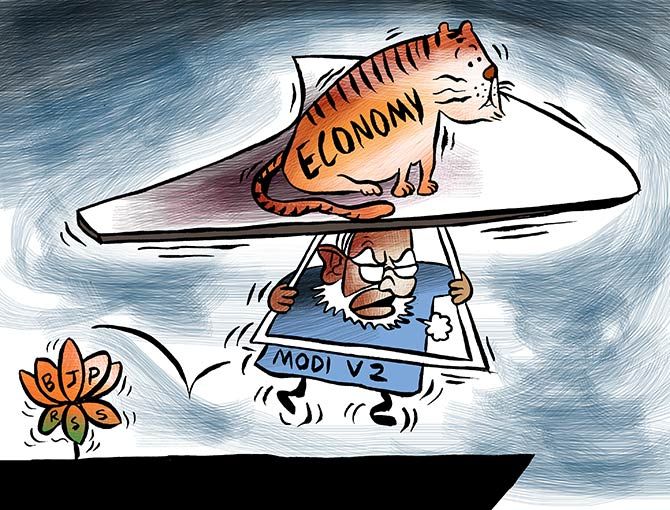There is talk of a fresh approach to a new labour code as well as reforming land acquisition laws in such a way as to be politically.
Illustration: Uttam Ghosh/Rediff.com

In its second term, the Narendra Modi government wants to embark on new reforms and complete the unfinished business of its first term at a difficult time when economic growth is slowing and resources to boost the economy are difficult to find.
Officials who have drafted the Finance Ministry's 100-day agenda said the government will focus on reducing the cost of land, labour, and capital.
"The last five years were about consolidation and tackling cronyism. The next five years will be about growth.
"Reducing the cost of land, labour, and capital will be important in that context," said an official.
There is talk of a fresh approach to a new labour code as well as reforming land acquisition laws in such a way as to be politically acceptable across the board although, with a bigger majority this time, the need for wider support may be less necessary.
But the obstacle standing in the way of land acquisition reform is the pressing need for a pre-requisite judicial overhaul.
Without this, new land and labour contracts will get stuck.
"There are so many pending cases from the apex court to the lower courts.
"One way the backlogs can be cleared is by increasing the manpower of the judicial system.
"Work on this will start in the first 100 days," said an official.
On the expenditure and fiscal front, finance ministry officials have suggested rationalizing subsidy expenditure and reducing the number of schemes supported by the Centre.
This assumes importance since the government has to focus on maintaining its fiscal deficit at 3.4 per cent of GDP in the current financial year, the same as the one projected for FY'19.
Already the fiscal deficit target for FY'19 has been surpassed by 34 per cent till February.
Maintaining the fiscal deficit has to be done despite new schemes and announcements that are expected for fisheries, insurance cover and credit card for traders and the extension of the PM Kisan scheme to landless farmers, all of which will lead to higher expenditure outlays.
On divestment, the Centre wants to go big on strategic sales, starting with marquee names such as Air India and Pawan Hans.
It had budgeted Rs 90,000 crore from disinvestment in the current financial year in the interim Budget against the Rs 84,000 crore revised estimate in 2018-19.
Only when the full Budget, likely to be presented in July, is out will it be possible to check if the number has been retained or changed.
The chances of a change in the number are high as tax revenue collections have fallen short by Rs 1.6 trillion in 2018-19 and this may well prompt the new government to consider significantly revising the collection targets downwards in the full Budget.
Given that government is thinking of reducing personal income tax rates further to put more disposable income in the hands of people to spur growth, this will further dent tax collections and put more pressure on the government to lower the target.
Commerce & Industry Ministry
As the prospects for high export growth remain dim owing to the subdued outlook for exports in the second quarter of the current financial year by the World Trade Organisation, officials said providing access to credit, easing costs, and bridging the liquidity gap are going to be a major focus of policymakers.
With job creation a key concern for the new government, the main focus of the ministry is undoubtedly the much-touted industrial policy that has been in the pipeline for two years now.
In March, the government felt it was still lacking and sent it back to the drawing board.
Attracting $100 billion worth of foreign direct investment annually, technology transfer, and the growth of micro, small, and medium enterprises will be other key areas.
The new economy won't be ignored either.
The government has already raised the investment limit in start-ups from Rs 10 crore to Rs 25 crore from accredited investors so that they can qualify for exemption from the angel tax, subject to some riders.
Ministry of Corporate Affairs
The government has an unfinished agenda to bring India into the top 50 in the World Bank's Ease of Doing Business rankings.
It has succeeded in raising India to 77, quite a feat considering that it was 140 when the NDA assumed power in 2014.
One of the factors that determine the ranking is resolving insolvency.
India is still at the 108th position.
To help the country rise up the rankings, the Ministry of Corporate Affairs is working on amendments to the Insolvency and Bankruptcy Code that envisage pre-packaged insolvency, bringing out the individual bankruptcy regime, and cross border insolvency.











